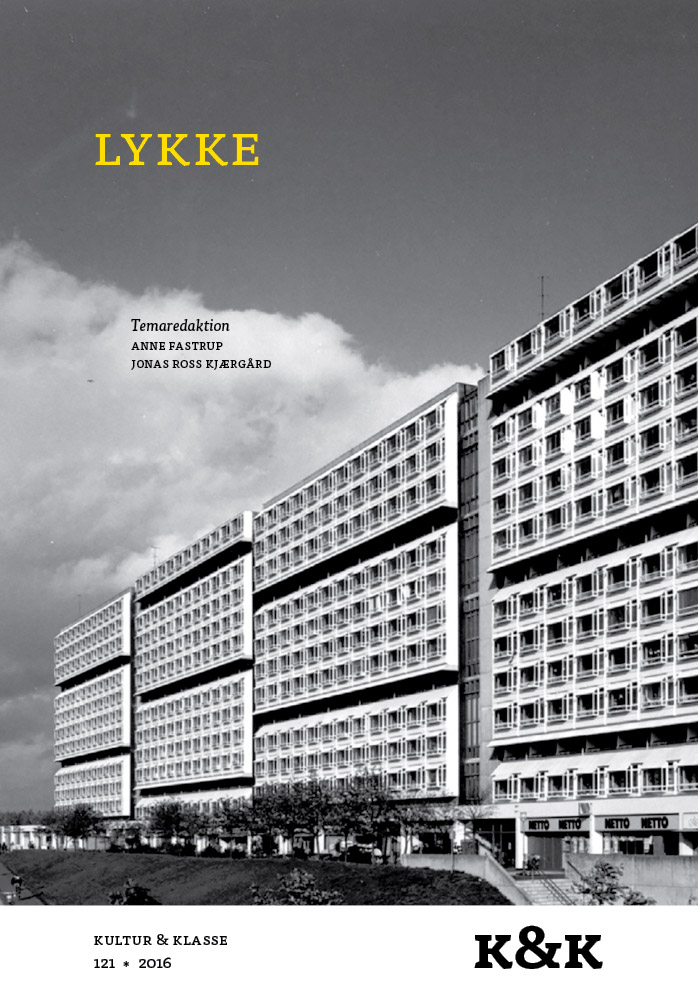Jean-Jacques Rousseaus bonheur
DOI:
https://doi.org/10.7146/kok.v44i121.23741Nøgleord:
Rousseau, happiness, affect, politics, social bondResumé
The eighteenth century bears witness to the emergence of a new, politicized notion of “happiness”. Elaborated conceptually by Greek philosophy as a moral concept, “happiness”, the Age of Enlightenment employs the term to identify and articulate a possible nexus between the self-realization of the individual and the virtues and material blessings of peaceful communal life. It is against such a backdrop that the role played by le bonheur in Jean-Jacques Rousseau’s writings becomes fully understandable. Like the author himself, his literary alter egos – Jean-Jacques, Saint-Preux, Emile et al. – share one fundamental drive, “the pursuit of happiness”. While in general Rousseau’s various accounts of these different life projects draw considerable narrative energy from the malheur experienced by their protagonists, they nevertheless contain moments of sublime quality where happiness is experienced as a fulfillment of both spiritual and corporeal nature. Whether happiness is found in the collective joy of a community, in the immediate communication between two lovers, or in the reveries of a solitary wanderer, the experience of happiness becomes the symptom of a way of living that successfully mediates between man’s two conflicting natures, his social and his natural existence. What this article sets out to show is how the idea of happiness as a manifestation of what Rousseau calls le sentiment intérieur is used to explore the possibility of a political order that successfully negotiates the social and the natural, the communal and the individual. Rousseau’s œuvre can thus be read as a systematic investigation into the possibility of establishing a social bond based on affective relations of varying size and complexity: The polis, the family and the individual. My main argument is that there is a clear development in Rousseau’s writing that eventually leads to the renunciation of the political utopism of his early writings to the advantage of a politics of the individual manifest in the old philosopher’s self-elected internal exile.
Referencer
Bjørskov, Christian. Lykke. Århus: Århus Universitetsforlag, 2015.
Descartes, René. Discours de la méthode. Paris: Garnier-Flammarion, 1908.
Dictionnaire de l’Académie français. Paris, 1692. Online. 25. februar 2016 <https://books.google.fr/books?id=jEQ8AAAAMAAJ&pg=PP7#v=onepage&q&f=false>.
Dictionnaire de l’Académie français. Paris, 1727. Online. 25. februar 2016 <https://books.google.fr/books?id=jEQ8AAAAMAAJ&pg=PP7#v=onepage&q&f=false>.
Diderot, Denis & Jean le Rond D’Alembert (red.). Encyclopédie ou Dictionnaire raisonné des sciences, des arts et des métiers, par une Société de Gens de lettre. Online. 25. februar 2016 <http://encyclopedie.uchicago.edu/>
Foucault, Michel. «Omnes et singulatim», i Dits et écrits, vol. III. Paris: Gallimard, 1994.
Foucault, Michel. Sécurité, territoire, population, 1977-1978. Paris: Gallimard-Seuil, 2004.
Furetière, Antoine. Dictionnaire universel contenant generalement tous les mots françois, tant vieux que modernes, & les termes de toutes les sciences et des arts, Paris 1690. Online. 25. februar 2016 <http://gallica.bnf.fr/ark:/12148/bpt6k50614b>
Mauzi, Robert. L’idée du bonheur dans la littérature et la pensée françaises au XVIIIe siècle. Paris: Librairie Armand Colin, 1960.
McMahon, Darrin M. The Pursuit of Happiness: A History from the Greeks to the Present. London: Penguin, 2006.
Ritter, Joachim. Historisches Wörterbuch der Philosophie. Basel: Schwabe Verlag, 1971-2007.
Rousseau, Jean-Jacques. Les Confessions, Œuvres complètes. Vol. 1. Paris: Pléiade, Gallimard, 1959.
Rousseau, Jean-Jacques. Rousseau, juge de Jean-Jacques, Œuvres complètes. Vol. 1. Paris: Pléiade, Gallimard, 1959.
Rousseau, Jean-Jacques. Discours sur l’origine et les fondements de l’inégalité parmi les hommes, Œuvres complètes. Vol. 3. Paris: Pléiade, Gallimard, 1964.
Rousseau, Jean-Jacques. Fragments politiques, Œuvres complètes. Vol. 3. Paris: Pléiade, Gallimard, 1964.
Rousseau, Jean-Jacques. Lettre à d’Alembert, Œuvres complètes. Vol. 5. Paris: Pléiade, Gallimard, 1994.
Rousseau, Jean-Jacques. Essai sur l’origines de langues, Œuvres complètes. Vol. 5. Paris: Pléiade, Gallimard, 1994.
Rousseau. Jean-Jacques. Julie eller den nye Héloise. Oslo: Bokvennen forlag, 1999.
Rousseau. Jean-Jacques. Om ulikheten til menneskene — dens opprinnelse og grunnlag. Oslo: Aschehoug, 1984.
Rousseau, Jean-Jacques. Den ensomme vandrers drømmerier. Oslo: Bokvennen forlag, 1995.
Rousseau, Jean-Jacques. Samfunnspakten. Oslo: De norske bokklubbene, 2001.
Starobinski, Jean. L’Œil vivant II. La Relation critique. Paris: Gallimard, 1970.
Downloads
Publiceret
Citation/Eksport
Nummer
Sektion
Licens
Tidsskriftet følger dansk ophavsret.





